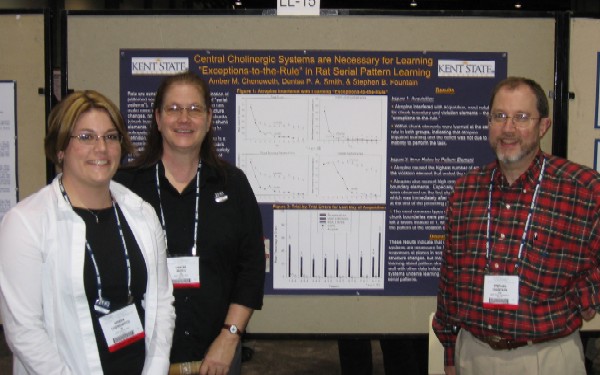Poster Presentation Abstract:

Central Cholinergic Systems
are Necessary for Learning “Exceptions-to-the-Rule” in Rat Serial
Pattern Learning. PDF
A. M. Chenoweth, D. P. A. Smith, and S. B.
Fountain. Department of Psychology, Kent State University, Kent,
OH 44242
Rats are sensitive
to the structural organization of patterned sequences of responses
(i.e., of "serial patterns"). For example, during acquisition rats make
more errors at places where the structure changes, namely, on the first
elements of chunks, than on within-chunk elements. Rats also have
difficulty learning to anticipate violation elements that are, by
definition, “exceptions-to-the-rule.” Atropine is a muscarinic
cholinergic antagonist which impairs acquisition and retention
performance on a variety of cognitive tasks. We examined the effects of
atropine on acquisition of serial patterns. Rats were given daily i.p.
injections of either saline or atropine sulfate (50 mg/kg) and trained
in an octagonal operant chamber equipped with a lever on each wall.
They learned to press the levers in a particular order (the serial
pattern) for brain-stimulation reward in a discrete-trial procedure with
correction. The two groups learned a pattern composed of eight 3-element
chunks ending with a violation element:
123 234 345 456 567 678 781 818
where the digits
represent the clock-wise positions of levers in the chamber, spaces
indicate 3-s pauses, and other intertrial intervals were 1 s. Central
cholinergic blockade by atropine caused profound impairments in
acquisition for chunk boundary elements (the first element of chunks)
and the violation element of the pattern, but did not affect acquisition
for within-chunk elements relative to saline-injected rats. The results
indicate that intact central cholinergic systems are necessary for
learning appropriate responses at places in sequences where pattern
structure changes.
|